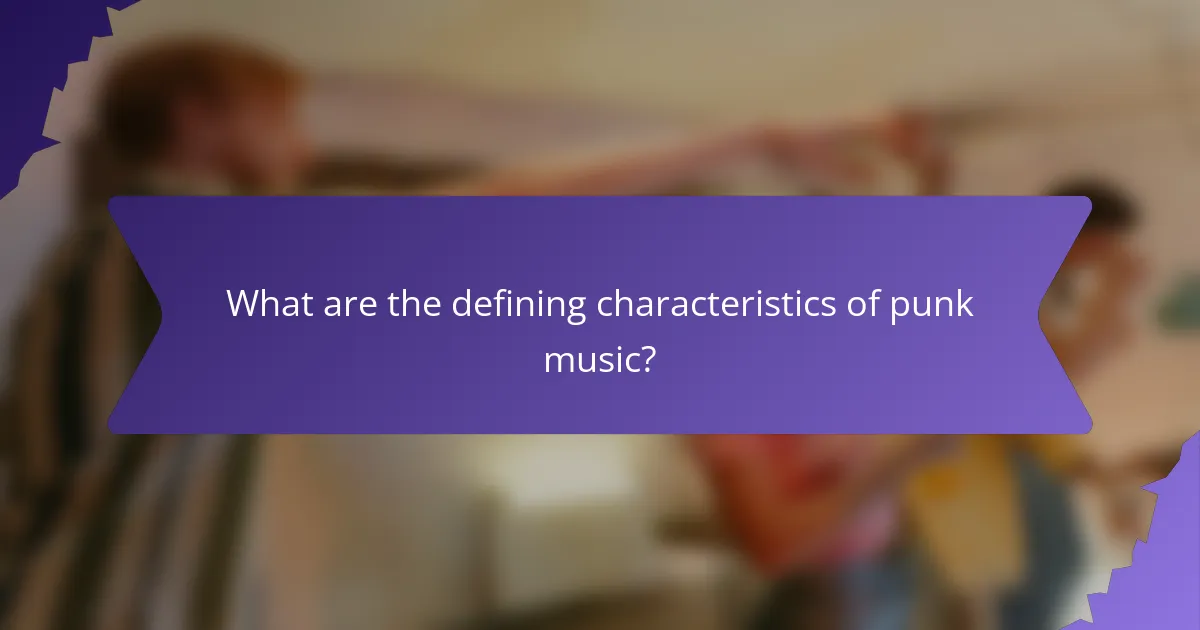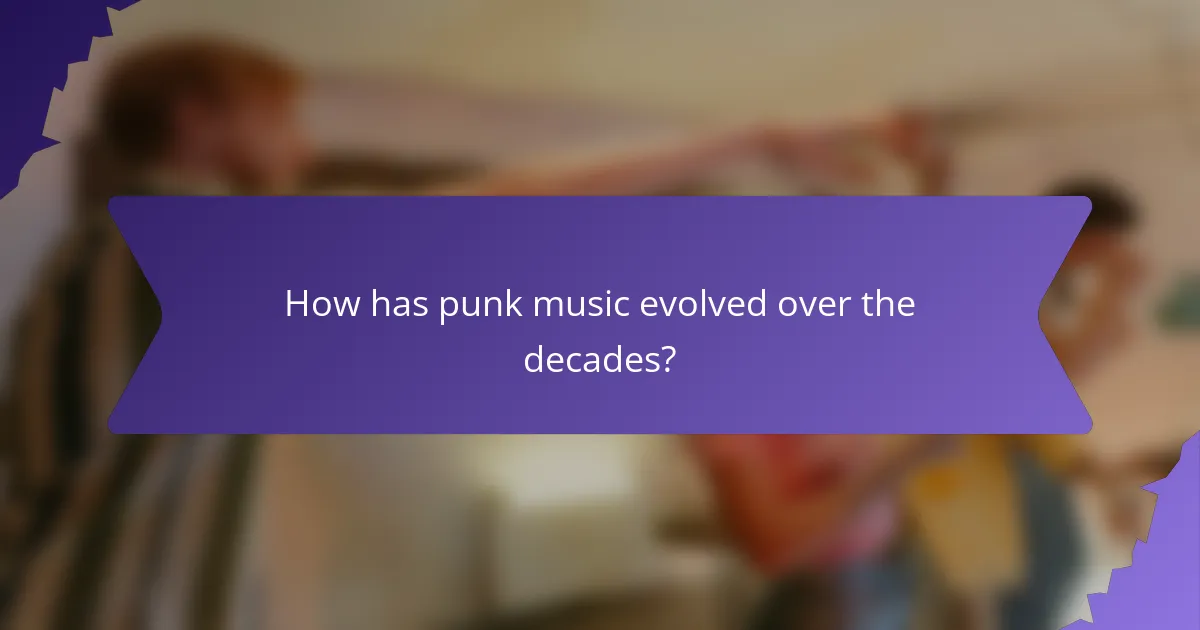Punk music challenges societal norms and offers a voice for the marginalized. This article explores its origins rooted in social unrest, key characteristics like raw energy and DIY ethos, and its role as social commentary addressing political issues. It also examines the evolution of punk through various subgenres and the cultural significance of punk festivals. Misconceptions surrounding punk music will be clarified, highlighting its rich diversity and ongoing influence.

What are the historical influences that shaped punk music?
Punk music was shaped by various historical influences, including social unrest, political movements, and earlier musical genres. The 1970s saw a rise in anti-establishment sentiments, which fueled punk’s rebellious spirit. Influences included garage rock, glam rock, and the social climate of urban decay. The punk movement also drew from the DIY ethos, emphasizing self-production and independence from major record labels. This unique blend of attributes created a distinct sound and identity that challenged mainstream norms.
How did the socio-political climate of the 1970s impact punk music?
The socio-political climate of the 1970s significantly shaped punk music by fostering its rebellious spirit. Economic turmoil, political disillusionment, and social unrest fueled a desire for change among youth. Punk emerged as a response to mainstream culture, characterized by its anti-establishment lyrics and raw sound. Bands like The Sex Pistols and The Clash voiced frustrations over unemployment and political corruption, reflecting the era’s discontent. This unique attribute of punk music as a form of social commentary distinguished it from other genres, making it a powerful vehicle for expression during a turbulent time.
Which artists and bands were pivotal in the emergence of punk music?
The emergence of punk music was significantly influenced by artists and bands like The Ramones, Sex Pistols, and The Clash. These groups shaped the genre’s rebellious spirit and raw sound. The Ramones, known for their fast-paced songs, brought a unique energy that defined early punk. The Sex Pistols introduced provocative lyrics and a confrontational style, while The Clash incorporated diverse musical influences, expanding punk’s reach. Each contributed distinct attributes that solidified punk’s identity in the music landscape.
What role did DIY culture play in the development of punk music?
DIY culture was crucial in shaping punk music by promoting independence and self-expression. It encouraged musicians to create outside traditional music industry constraints. This ethos led to a raw, authentic sound that reflected social dissatisfaction. Punk bands often produced their own music, organized shows, and crafted their own merchandise, embodying the DIY spirit. As a result, punk became a vehicle for social commentary, addressing issues like inequality and political unrest. The unique attribute of punk is its emphasis on grassroots movements, which empowered marginalized voices within the music scene.

What are the defining characteristics of punk music?
Punk music is defined by its raw energy, anti-establishment lyrics, and DIY ethos. Originating in the mid-1970s, it emphasizes fast tempos, simple chords, and a rebellious attitude. Key characteristics include a focus on social commentary, often addressing political issues and personal freedom. Unique attributes of punk music involve its cultural impact, influencing fashion and art, while rare elements might include specific subgenres like pop-punk or hardcore punk.
How does punk music differentiate itself through its sound and instrumentation?
Punk music differentiates itself through its raw sound and minimalist instrumentation. Characterized by fast tempos, distorted guitars, and aggressive vocals, punk emphasizes simplicity and energy. The typical punk band often features electric guitar, bass, and drums, creating a powerful, unrefined sound. Unique attributes include the use of unconventional song structures and a DIY ethos, setting it apart from mainstream genres.
What themes and messages are commonly found in punk lyrics?
Punk lyrics commonly express themes of rebellion, anti-establishment sentiments, and social critique. They often address issues like political oppression, consumerism, and personal freedom. The raw emotion in punk music serves as a unique attribute, resonating with listeners seeking authenticity and empowerment. Additionally, rare themes include mental health struggles and existential angst, reflecting deeper societal issues. These messages contribute to punk’s enduring relevance in modern culture.
Which fashion styles are associated with punk culture?
Punk culture is associated with styles that emphasize individuality and rebellion. Key fashion styles include leather jackets, ripped jeans, band t-shirts, and combat boots. Accessories often feature spikes, chains, and DIY elements, reflecting a unique aesthetic that challenges mainstream trends.

How has punk music evolved over the decades?
Punk music has evolved significantly since its inception in the 1970s, reflecting cultural and social changes. Initially characterized by its raw sound and anti-establishment lyrics, punk has diversified into various subgenres.
In the 1980s, hardcore punk emerged, emphasizing speed and aggression, while the 1990s saw the rise of pop-punk, blending catchy melodies with punk’s rebellious spirit. The 2000s introduced emo, a subgenre focusing on emotional expression.
Today, punk continues to adapt, incorporating elements from other genres like hip-hop and electronic music. This evolution illustrates punk’s resilience and its ongoing commentary on societal issues.
What are the significant subgenres of punk music?
Punk music features several significant subgenres, each with distinct characteristics. Notable subgenres include hardcore punk, pop punk, post-punk, and ska punk. Hardcore punk is known for its fast tempos and aggressive sound. Pop punk blends catchy melodies with punk energy, while post-punk explores experimental sounds and themes. Ska punk incorporates elements of ska music, adding a unique rhythm and brass instrumentation. Each subgenre reflects the core punk ethos of rebellion and social commentary.
How have technological advancements influenced punk music production?
Technological advancements have significantly transformed punk music production by enhancing accessibility and creativity. Digital audio workstations allow artists to produce high-quality recordings from home. This democratization of music production enables diverse voices in punk to emerge, fostering innovation in sound and style. Additionally, advancements in social media facilitate the rapid dissemination of music, connecting artists with global audiences. As a result, punk music continues to evolve, reflecting contemporary issues and diverse influences.

In what ways does punk music serve as social commentary?
Punk music serves as social commentary by challenging societal norms and highlighting political issues. It critiques authority and consumerism through direct lyrics and aggressive sound. Punk often addresses themes such as inequality, war, and personal freedom, making it a voice for marginalized groups. This genre’s raw energy and DIY ethos empower listeners to question the status quo and advocate for change.
How do punk songs address issues of social justice and inequality?
Punk songs often critique social justice issues and highlight inequality. They serve as a voice for marginalized communities and challenge systemic oppression. For example, bands like The Clash and Dead Kennedys address topics such as racism, poverty, and government corruption. Their raw lyrics and aggressive sound amplify the urgency of these issues. Punk music’s unique attribute lies in its ability to inspire activism and foster a sense of community among listeners.
What impact has punk music had on youth culture and activism?
Punk music has significantly influenced youth culture and activism by promoting individuality and social change. It emerged in the 1970s as a response to political and social issues, encouraging young people to challenge the status quo.
The raw energy and rebellious spirit of punk music inspired youth to express discontent with societal norms. Bands like The Clash and Sex Pistols became symbols of resistance, motivating young activists to engage in political discourse and social movements.
Punk’s DIY ethic empowered youth to create their own art and music, fostering a sense of community and collective action. This grassroots approach has persisted, leading to various social initiatives and movements that advocate for change.
Overall, punk music’s legacy continues to resonate, shaping the values and actions of successive generations in their pursuit of social justice and personal freedom.

Which punk music festivals and events are essential to the culture?
Punk music festivals and events essential to the culture include the Punk Rock Bowling Festival, Rebellion Festival, and Fest. These gatherings celebrate punk’s roots and community.
Punk Rock Bowling Festival, held annually in Las Vegas, features live performances and bowling tournaments, attracting thousands of fans. Rebellion Festival takes place in Blackpool, UK, showcasing a diverse lineup of punk bands and fostering connections within the scene. Fest, located in Gainesville, Florida, is known for its inclusive atmosphere and variety of punk subgenres, making it a key event for fans.
These festivals not only highlight punk music’s evolution but also emphasize its social commentary through art and community engagement.
What role do local scenes play in the punk music community?
Local scenes are vital in the punk music community as they foster grassroots movements and provide platforms for expression. These scenes create spaces for local bands to perform, enabling them to connect with audiences and build a following. The DIY ethic prevalent in punk encourages collaboration among musicians, artists, and fans, reinforcing a sense of community.
Moreover, local scenes often reflect unique cultural and social issues, allowing punk music to serve as a powerful form of social commentary. This localized approach helps to maintain the genre’s authenticity and relevance, ensuring that punk music evolves while staying true to its roots.
How do international punk scenes differ in their expression and themes?
International punk scenes express diverse themes influenced by cultural, political, and social contexts. For example, American punk often critiques consumerism, while UK punk focuses on class struggles. In contrast, Japanese punk incorporates unique elements from local traditions. Each scene’s expression reflects its societal issues, showcasing a rich tapestry of punk culture worldwide.

What are some common misconceptions about punk music?
Many misconceptions exist about punk music, often oversimplifying its essence. Punk is not merely loud, aggressive music; it encompasses a rich cultural and social commentary.
One common misconception is that punk is solely anti-establishment. While it often critiques societal norms, it also promotes self-expression and community. Another myth is that punk music lacks musicality; in reality, it features diverse influences and skilled musicianship.
Additionally, some believe punk is a homogeneous genre. In truth, punk includes various subgenres, each with unique characteristics. Lastly, the idea that punk is outdated fails to recognize its ongoing evolution and influence in contemporary music.
How does the mainstream perception of punk differ from its underground roots?
The mainstream perception of punk often emphasizes its rebellious image and commercial success, while its underground roots focus on authenticity and grassroots activism. Mainstream punk is characterized by polished production and broader appeal, whereas underground punk values DIY ethics and raw sound. The evolution of punk from subculture to mainstream phenomenon illustrates a shift from its original message of social commentary to a more commercialized version that sometimes dilutes its core values. This divergence highlights the unique attributes of punk’s underground origins, which prioritize community and resistance over mass-market acceptance.
What are the challenges faced by contemporary punk artists?
Contemporary punk artists face challenges such as commercialization, maintaining authenticity, and addressing social issues. The genre’s roots in rebellion conflict with mainstream acceptance, often diluting its message. Additionally, artists struggle with limited access to platforms that promote independent voices. Competition from various music styles further complicates their efforts to stand out. The evolving music industry landscape demands adaptation, making it difficult to stay true to punk’s original ethos while reaching wider audiences.
What can listeners learn from the evolution of punk music?
Listeners can learn about the cultural and political impact of punk music through its evolution. Punk music emerged in the 1970s as a reaction against mainstream rock and societal norms. It emphasized DIY ethics, raw sound, and anti-establishment lyrics. The genre’s evolution showcases how artists address social issues, such as class struggle and personal freedom. Notable bands like The Ramones and Sex Pistols highlighted rebellion, influencing various music styles and movements. Additionally, punk’s adaptability has led to subgenres that explore diverse themes, enriching listeners’ understanding of its broader significance.
How can fans support the punk music scene today?
Fans can support the punk music scene today by actively engaging with local artists and events. Attend live shows to boost attendance and revenue for musicians. Purchase merchandise directly from bands to ensure they receive fair compensation. Share music and promote artists on social media to increase their visibility. Participate in community initiatives that foster punk culture, such as DIY events or music festivals. Collaborate with local venues to create spaces for punk performances. Lastly, support independent record labels that prioritize punk music.